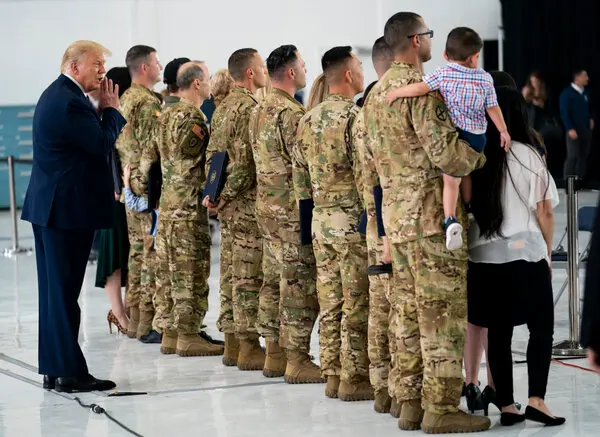In a dramatic clash between state and federal powers, a federal appeals court has temporarily allowed President Donald Trump to maintain control over thousands of California National Guard troops deployed in Los Angeles. This decision, issued late on June 12, 2025, by the 9th U.S. Circuit Court of Appeals, pauses a lower court ruling that declared Trump’s federalization of the Guard unlawful, setting the stage for a heated legal showdown.
The conflict began when Trump deployed over 4,000 National Guard troops and 700 Marines to Los Angeles to address protests sparked by Immigration and Customs Enforcement (ICE) raids. California Governor Gavin Newsom, a Democrat, fiercely opposed this move, arguing that the militarized presence was unnecessary and likely to escalate tensions. Newsom, alongside California Attorney General Rob Bonta, challenged the deployment in court, claiming that Trump’s actions violated federal law and the Tenth Amendment, which reserves powers to the states.
A Federal Judge’s Rebuke
On June 12, 2025, U.S. District Judge Charles Breyer issued a temporary restraining order, halting Trump’s deployment of the National Guard in Los Angeles. In a sweeping 36-page ruling, Breyer declared that Trump’s federalization of the Guard was illegal because it bypassed required procedures, including notifying Newsom. Breyer emphasized that the protests in Los Angeles did not constitute a “rebellion” or crisis justifying federal intervention. “There’s no invasion. There’s no rebellion,” Newsom echoed at a news conference, calling the ruling “a big day for the Constitution.”
Breyer’s order was a bold stand against what he described as the “unlawful militarization” of Los Angeles, warning that it could inflame tensions and risk lives. He rejected the Trump administration’s claim that the president has unreviewable power to declare a rebellion and deploy troops. “The president’s discretion does not mean he can unilaterally and without judicial review declare that a vacancy exists,” Breyer wrote, dismissing the administration’s arguments as “classic ipse dixit” (an assertion without proof).
The Appeals Court Steps In
Hours after Breyer’s ruling, the 9th Circuit Court of Appeals issued a stay, allowing Trump to keep control of the National Guard troops until a hearing scheduled for June 17, 2025. The three-judge panel did not explain its reasoning, but the move suggests an intent to maintain the status quo while further arguments are reviewed. The Trump administration celebrated the stay, arguing that Breyer’s order was an “extraordinary intrusion” on the president’s authority as Commander in Chief. They claimed it jeopardized federal officers by limiting their ability to protect federal property and personnel.
The Justice Department defended Trump’s actions, asserting that the president has the constitutional power to deploy the National Guard to quell protests and protect federal interests. They accused Breyer of “second-guessing” Trump’s military judgments, citing a nearly 200-year-old Supreme Court precedent that grants the president broad authority in such matters.
California’s Case and Broader Implications
California’s lawsuit, filed by Bonta, seeks to limit the National Guard and Marines to protecting federal facilities and personnel, preventing their involvement in civilian law enforcement, which is prohibited under the Posse Comitatus Act. Newsom argued that the deployment was not only unlawful but also dangerous, risking “irreparable harm to our communities.” Local officials, including Los Angeles District Attorney Nathan Hochman, have downplayed claims of widespread violence, noting that the vast majority of protesters are peaceful.
The legal battle highlights a broader tension between state and federal authority, with Newsom framing it as “a test of democracy.” Trump’s history of pushing for aggressive military responses—evident in his regret over not deploying troops during the 2020 Black Lives Matter protests—adds fuel to the debate. His campaign rhetoric in 2023, vowing not to wait for state approval in future deployments, underscores his intent to expand executive power.
What’s Next?
As the 9th Circuit prepares for its June 17 hearing, the nation watches closely. The outcome could set a precedent for how far a president can go in federalizing state National Guards without gubernatorial consent. For now, Trump retains control of the troops, but Breyer’s ruling and California’s resolve signal that this fight is far from over. The case may ultimately reach the U.S. Supreme Court, potentially reshaping the balance of power between state and federal governments.
“This is about pushing back against overreach,” Newsom said, vowing to defend California’s rights. As protests continue in Los Angeles and legal arguments intensify, the struggle over the California National Guard remains a critical flashpoint in the ongoing debate over executive authority and democratic principles.
